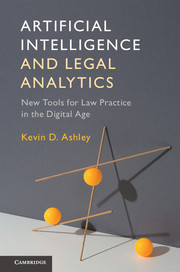Book contents
- Frontmatter
- Dedication
- Contents
- List of illustrations
- List of tables
- Acknowledgments
- PART I COMPUTATIONAL MODELS OF LEGAL REASONING
- PART II LEGAL TEXT ANALYTICS
- 6 Representing Legal Concepts in Ontologies and Type Systems
- 7 Making Legal Information Retrieval Smarter
- 8 Machine Learning with Legal Texts
- 9 Extracting Information from Statutory and Regulatory Texts
- 10 Extracting Argument-Related Information from Legal Case Texts
- PART III CONNECTING COMPUTATIONAL REASONING MODELS AND LEGAL TEXTS
- Glossary
- Bibliography
- Index
10 - Extracting Argument-Related Information from Legal Case Texts
from PART II - LEGAL TEXT ANALYTICS
Published online by Cambridge University Press: 13 July 2017
- Frontmatter
- Dedication
- Contents
- List of illustrations
- List of tables
- Acknowledgments
- PART I COMPUTATIONAL MODELS OF LEGAL REASONING
- PART II LEGAL TEXT ANALYTICS
- 6 Representing Legal Concepts in Ontologies and Type Systems
- 7 Making Legal Information Retrieval Smarter
- 8 Machine Learning with Legal Texts
- 9 Extracting Information from Statutory and Regulatory Texts
- 10 Extracting Argument-Related Information from Legal Case Texts
- PART III CONNECTING COMPUTATIONAL REASONING MODELS AND LEGAL TEXTS
- Glossary
- Bibliography
- Index
Summary
INTRODUCTION
Chapter 8 explained how ML can be applied to legal texts, and Chapter 9 explored methods for extracting information from statutory and regulatory texts. This chapter continues that discussion but focuses on using ML, NLP, and manually constructed rules to extract information from the texts of legal decisions, focusing particularly on argument-related information.
Information in legal cases is argument-related if it is about the roles of sentences and other information in the argument presented in a case. This includes sentence roles as, for example, statements of legal rules in the abstract or as applied to specific facts, or as case holdings and findings of fact. It also includes more general roles such as propositions in arguments, premises or conclusions, and the argument schemes (Section 5.2) that justify the conclusions given the premises, schemes such as analogizing the current facts to a prior case or distinguishing them. Finally, it comprises information that affects the strength of an argument such as legal factors, stereotypical fact patterns that strengthen a claim (Section 3.3.2), or evidence factors (Section 5.8).
At various points in this book, it has been asserted that argument-related information would support conceptual legal information retrieval if IR programs could identify it. The next chapter provides preliminary evidence in support of this claim. Here we discuss text analytic techniques that can extract some of this information from case texts. In particular, it describes an architecture for applying a type system and text annotation pipeline to process case texts for argument-related information about sentence roles. It continues the discussion of LUIMA (Legal UIMA), the law-specific semantic extraction toolbox based on the UIMA framework and designed to automate the conceptual markup of legal documents.
The chapter then revisits the task of manual annotation of legal texts, necessary in order to create training sets of documents for ML classification. Ostensibly a task for human annotators with some level of domain expertise, clever decomposition of the annotation tasks may make possible crowdsourced solutions for annotation.
The chapter provides answers to the following questions: How does IE extraction from legal case texts work? What roles do NLP, UIMA type systems, and ML play? How can the conceptual markup of legal documents be automated?
Information
- Type
- Chapter
- Information
- Artificial Intelligence and Legal AnalyticsNew Tools for Law Practice in the Digital Age, pp. 285 - 310Publisher: Cambridge University PressPrint publication year: 2017
